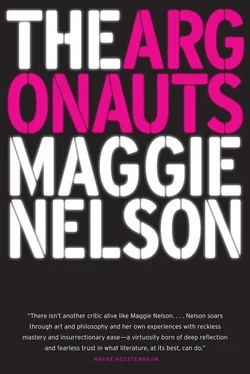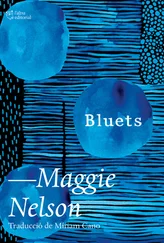Maggie Nelson - The Argonauts
Здесь есть возможность читать онлайн «Maggie Nelson - The Argonauts» весь текст электронной книги совершенно бесплатно (целиком полную версию без сокращений). В некоторых случаях можно слушать аудио, скачать через торрент в формате fb2 и присутствует краткое содержание. Год выпуска: 2015, ISBN: 2015, Издательство: Graywolf Press, Жанр: Биографии и Мемуары, на английском языке. Описание произведения, (предисловие) а так же отзывы посетителей доступны на портале библиотеки ЛибКат.
- Название:The Argonauts
- Автор:
- Издательство:Graywolf Press
- Жанр:
- Год:2015
- ISBN:9781555973407
- Рейтинг книги:3 / 5. Голосов: 1
-
Избранное:Добавить в избранное
- Отзывы:
-
Ваша оценка:
- 60
- 1
- 2
- 3
- 4
- 5
The Argonauts: краткое содержание, описание и аннотация
Предлагаем к чтению аннотацию, описание, краткое содержание или предисловие (зависит от того, что написал сам автор книги «The Argonauts»). Если вы не нашли необходимую информацию о книге — напишите в комментариях, мы постараемся отыскать её.
The Argonauts Writing in the spirit of public intellectuals such as Susan Sontag and Roland Barthes, Nelson binds her personal experience to a rigorous exploration of what iconic theorists have said about sexuality, gender, and the vexed institutions of marriage and child-rearing. Nelson's insistence on radical individual freedom and the value of caretaking becomes the rallying cry of this thoughtful, unabashed, uncompromising book.
The Argonauts — читать онлайн бесплатно полную книгу (весь текст) целиком
Ниже представлен текст книги, разбитый по страницам. Система сохранения места последней прочитанной страницы, позволяет с удобством читать онлайн бесплатно книгу «The Argonauts», без необходимости каждый раз заново искать на чём Вы остановились. Поставьте закладку, и сможете в любой момент перейти на страницу, на которой закончили чтение.
Интервал:
Закладка:
I guess the cheery way of looking at this snowball would be to say, subjectivity is keenly relational, and it is strange. We are for another, or by virtue of another . In my final weeks, I walked every day in the Arroyo Seco, listing aloud all the people who were waiting on earth to love Iggy, hoping that the promise of their love would eventually be enough to lure him out.
As my due date neared, I confided in Jessica, the woman who would be assisting our birth, that I was worried I wouldn’t be able to make milk, as I had heard of women who couldn’t. She smiled and said, You’ve made it already . Seeing me unconvinced, she said, Want me to show you? I nodded, shyly lifting a breast out of my bra. In one stunning gesture, she took my breast into her hand-beak and clamped down hard. A bloom of custard-colored drops rose in a ring, indifferent to my doubts.
According to Kaja Silverman, the turn to a paternal God comes on the heels of the child’s recognition that the mother cannot protect against all harm, that her milk — be it literal or figurative — doesn’t solve all problems. As the human mother proves herself a separate, finite entity, she disappoints, and gravely. In its rage at maternal finitude, the child turns to an all-powerful patriarch — God — who, by definition, cannot let anyone down. “The extraordinarily difficult task imposed upon the child’s primary caretaker not only by the culture but also by Being itself is to induct it into relationality by saying over and over again, in a multitude of ways, what death will otherwise have to teach it: ‘This is where you end and others begin.’
Unfortunately, this lesson seldom ‘takes,’ and the mother usually delivers it at enormous cost to herself. Most children respond to the partial satisfaction of their demands with extreme rage, rage that is predicated on the belief that the mother is withholding something that is within her power to provide.”
I get that if the caretaker does not teach the lesson of the “me” and the “not-me” to the child, she may not make adequate space for herself. But why does the delivery of this lesson come at such an enormous cost? What is the cost? Withstanding a child’s rage? Isn’t a child’s rage something we should be able to withstand?
Silverman also contends that a baby’s demands on the mother can be “very flattering to the mother’s narcissism, since it attributes to her the capacity to satisfy her infant’s lack, and so — by extension — her own. Since most women in our culture are egoically wounded, the temptation to bathe in the sun of this idealization often proves irresistible.” I have seen some mothers use their babies to fill a lack, or soothe an egoic wound, or bathe in the sun of idealization in ways that seemed pathological. But for the most part those people were pathological prior to having a baby. They would have had a pathological relation to carrot juice. Remnant Lacanian that she is, Silverman’s aperture does not seem wide enough to include an enjoyment that doesn’t derive from filling a void, or love that is not merely balm for a wound. So far as I can tell, most worthwhile pleasures on this earth slip between gratifying another and gratifying oneself. Some would call that an ethics.
Silverman does imagine, however, that this cycle could or should change: “Our culture should support [the mother] by providing enabling representations of maternal finitude, but instead it keeps alive in all of us the tacit belief that [the mother] could satisfy our desires if she really wanted to .” What would these “enabling representations” look like? Better parts for women in Hollywood movies? Books like this one? I don’t want to represent anything.
At the same time, every word that I write could be read as some kind of defense, or assertion of value, of whatever it is that I am, whatever viewpoint it is that I ostensibly have to offer, whatever I’ve lived. You know so much about people from the second they open their mouths. Right away you might know that you might want to keep them out . That’s part of the horror of speaking, of writing. There is nowhere to hide. When you try to hide, the spectacle can grow grotesque. Think of Joan Didion’s preemptive attempt, in Blue Nights , to quash any notion that her daughter Quintana Roo’s childhood was a privileged one. “‘Privilege’ is a judgment. ‘Privilege’ is an opinion. ‘Privilege’ is an accusation. ‘Privilege’ remains an area to which — when I think of what [Quintana] endured, when I consider what came later — I will not easily cop.” These remarks were a pity, since her account of “what came later”—Quintana’s death, on the heels of the death of Didion’s beloved husband — underscores Didion’s more interesting, albeit disavowed subject, which is that economic privilege does not protect against all suffering.
I am interested in offering up my experience and performing my particular manner of thinking, for whatever they are worth. I would also like to cop easily to my abundant privilege — except that the notion of privilege as something to which one could “easily cop,” as in “cop to once and be done with,” is ridiculous. Privilege saturates , privilege structures . But I have also never been less interested in arguing for the rightness, much less the righteousness, of any particular position or orientation. What other reason is there for writing than to be traitor to one’s own reign, traitor to one’s own sex, to one’s class, to one’s majority? And to be traitor to writing .
Afraid of assertion. Always trying to get out of “totalizing” language, i.e., language that rides roughshod over specificity; realizing this is another form of paranoia. Barthes found the exit to this merry-go-round by reminding himself that “it is language which is assertive, not he.” It is absurd, Barthes says, to try to flee from language’s assertive nature by “add[ing] to each sentence some little phrase of uncertainty, as if anything that came out of language could make language tremble.”
My writing is riddled with such tics of uncertainty. I have no excuse or solution, save to allow myself the tremblings, then go back in later and slash them out. In this way I edit myself into a boldness that is neither native nor foreign to me.
At times I grow tired of this approach, and all its gendered baggage. Over the years I’ve had to train myself to wipe the sorry off almost every work e-mail I write; otherwise, each might begin, Sorry for the delay, Sorry for the confusion, Sorry for whatever. One only has to read interviews with outstanding women to hear them apologizing . But I don’t intend to denigrate the power of apology: I keep in my sorry when I really mean it. And certainly there are many speakers whom I’d like to see do more trembling, more unknowing, more apologizing.
While beholding Steiner’s Puppies and Babies , I couldn’t help but think of Nan Goldin’s 1986 “visual diary,” The Ballad of Sexual Dependency —another series of photographs that bears witness to the friends, lovers, and exes that make up the photographer’s tribe. As the titles of the two works suggest, however, their moods differ sharply. One of the most Goldinesque photos in Puppies and Babies is an interior shot, just out of focus, of dancer Layla Childs (Steiner’s ex), half-dressed and staring blankly at the camera, bathed in a dim red light. But instead of sporting a tear-stained face or bruises from a recent battering, à la Ballad , Childs is pumping milk from her breasts via a “hands free” pumping bra and double electric pump.
Pumping milk is, for many women, a sharply private activity. It can also be physically and emotionally challenging, as it reminds the nursing mother of her animal status: just another mammal, milk being siphoned from its glands. Beyond photographs in breast pump manuals (and lactation porn), however, images of milk expression are really nowhere to be found. Phrases such as colostrum, letdown , and hindmilk arrive in one’s life like hieroglyphs from the land of the lost. So the presence of Steiner’s camera here — and the steadfast stare of her subject — feels jarring and exciting. This is especially so when you consider how photographers such as Goldin (or Ryan McGinley, or Richard Billingham, or Larry Clark, or Peter Hujar, or Zoe Strauss) often make us feel as though we have glimpsed something radically intimate by evoking danger, suffering, illness, nihilism, or abjection. In Steiner’s intimate portrait of Childs, the proposed transmission of fluids is about nourishment. I almost can’t imagine .
Читать дальшеИнтервал:
Закладка:
Похожие книги на «The Argonauts»
Представляем Вашему вниманию похожие книги на «The Argonauts» списком для выбора. Мы отобрали схожую по названию и смыслу литературу в надежде предоставить читателям больше вариантов отыскать новые, интересные, ещё непрочитанные произведения.
Обсуждение, отзывы о книге «The Argonauts» и просто собственные мнения читателей. Оставьте ваши комментарии, напишите, что Вы думаете о произведении, его смысле или главных героях. Укажите что конкретно понравилось, а что нет, и почему Вы так считаете.












